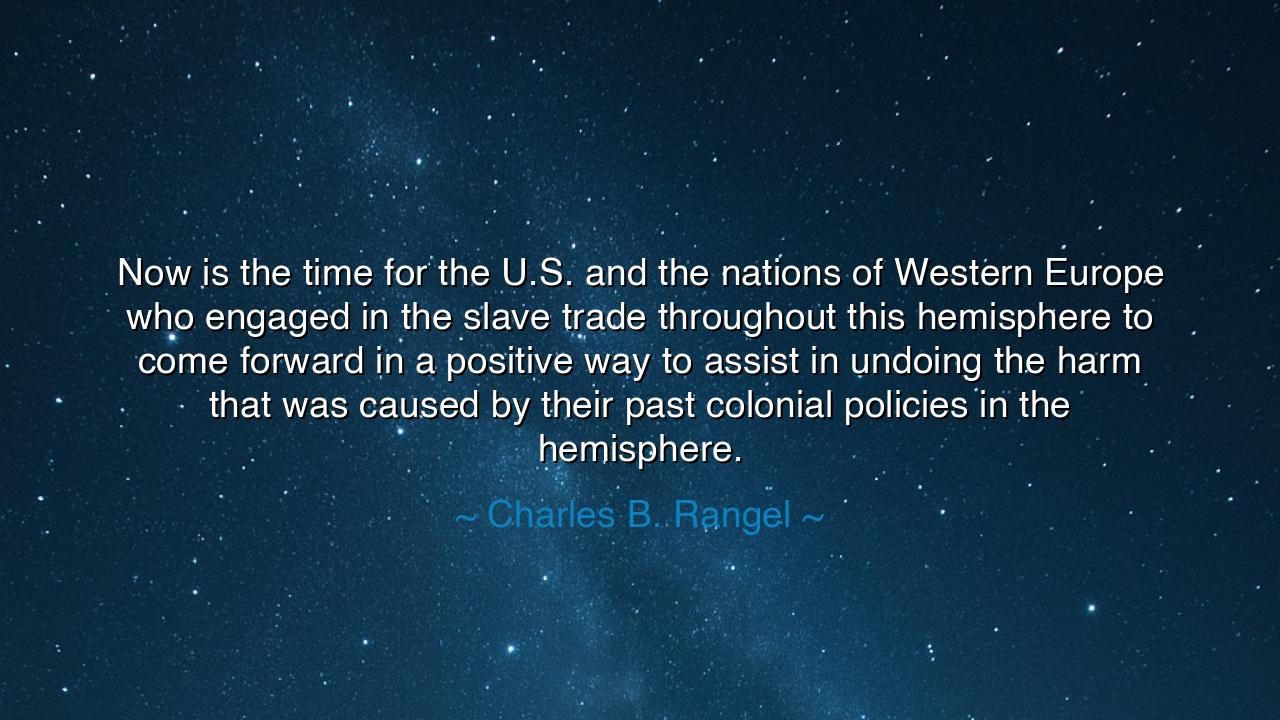
Now is the time for the U.S. and the nations of Western Europe
Now is the time for the U.S. and the nations of Western Europe who engaged in the slave trade throughout this hemisphere to come forward in a positive way to assist in undoing the harm that was caused by their past colonial policies in the hemisphere.






The words of Charles B. Rangel, “Now is the time for the U.S. and the nations of Western Europe who engaged in the slave trade throughout this hemisphere to come forward in a positive way to undo the harm that was caused by their past colonial policies in the hemisphere,” resound as a solemn summons. They are not the whispers of accusation, but the thunder of justice calling from the depths of centuries. For the wounds of history do not vanish with silence; they echo in the lives of the living, carried in the struggles of descendants who still bear the weight of chains broken yet not forgotten.
The origin of this call lies in the darkest commerce humanity ever devised—the transatlantic slave trade, where millions of African souls were torn from their homelands, shackled, and scattered across oceans to toil in plantations and mines. This was not mere labor stolen, but generations uprooted, cultures fractured, and spirits scarred. The colonial policies that upheld such cruelty enriched empires, yet left nations impoverished and peoples dispossessed. The debt of this injustice remains unpaid, stretching like a shadow across the modern world.
Consider the story of Toussaint Louverture and the Haitian Revolution. From the soil drenched in blood and suffering, enslaved men and women rose up against their oppressors and forged the first free Black republic in the New World. Though victorious, Haiti was punished by the very nations that enslaved its people, forced to pay crippling reparations to France for its freedom. Even in liberty, the chains of colonial harm endured, binding the nation in poverty for generations. This is but one story among countless, showing how injustice once sown continues to bear bitter fruit.
When Rangel declares that “now is the time,” he speaks of responsibility long deferred. The call is not for vengeance but for restoration—for the strong to aid those they once broke, for nations to acknowledge the truth of their past, and for the wealth born of cruelty to be used in the service of healing. This is not charity, but justice; not guilt, but wisdom recognizing that the sins of history must be answered with acts of courage in the present.
The meaning of this quote is as much about the future as it is about the past. For the descendants of the enslaved, true equality cannot rest solely on words of apology but must be carried in deeds of repair—investment in communities, recognition of dignity, and commitment to lifting the burdens that history placed upon their shoulders. Only then can the hemisphere, scarred but still alive with hope, move toward wholeness.
Let the generations to come remember this: the harm of the past cannot be ignored, but it can be transformed. And when nations, humbled yet resolute, rise to mend what was broken, the legacy of pain may at last be turned into a legacy of justice, strength, and redemption.






PTHoang Thi Phuong Thuy
While Rangel’s words are compelling, I can’t help but think about the complexity of global politics today. With nations having differing levels of involvement in the slave trade, how can we expect a unified approach to this issue? Wouldn’t it be more effective for affected communities to lead these efforts with international support rather than solely relying on governments to take the initiative?
TPle tien phuong
The historical context behind this statement is crucial, but I’m left wondering what practical steps could be taken to make meaningful change. Would it be enough for governments to apologize, or should they fund initiatives that address the ongoing consequences of slavery? What would truly symbolize a positive way forward?
TTDung Cao Thi Thuy
Rangel's call to action raises an important point. However, how do we hold countries accountable for their historical actions while also promoting progress in the present? Is there a way to acknowledge the past without it becoming a barrier to future relationships and development, especially for the descendants of those affected?
DNDuy Nguyen
The idea of Western nations stepping forward to undo the harm caused by their colonial policies is significant. However, I wonder if it's realistic for these countries to truly rectify centuries of exploitation. Could this lead to tension in diplomatic relations, or would it open up a new chapter of international cooperation?
DKTran Dang Khoa
I agree with Rangel that there is a responsibility for nations involved in the slave trade to take some action in addressing its legacy. But are we talking about direct compensation or something broader like historical accountability and education? How can we ensure that these efforts are genuinely helpful rather than merely performative?